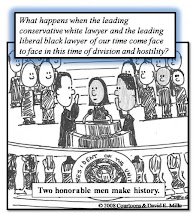
By Norm Kent
In New York City last week, a Vogue model made headlines not by being on the cover of a new magazine but by being referred to as a ‘skank’ on a rather inconsequential and insignificant blog.
The model, Liskula Cohen, has now filed a lawsuit against Google and its Blogger.com website, seeking the identity of the anonymous blogger.
Although the entire blog was generated on a single day and it contains a total of solely five posts, the blog entries refer to the model derogatorily as a "ho," a “#1 skanky superstar,” and otherwise depict her as sexually promiscuous, dishonest, and unclean.
Because the site is hosted through Google's Blogger service, Cohen is asking the court to order Google to disclose identifying information including the blogger's name, address, telephone number and email.
As a policy matter, Google does not reveal bloggers' identities without a court order. "We take great care to respect privacy concerns and will only provide information about a user in response to a subpoena or other court order," a spokesperson said. Good for them.
On January 5, the court issued an "order to show cause," which requires Google to appear before the court on January 26 for arguments about whether disclosure of the blogger's identity should be ordered.
New York attorney Steven Wagner represents Cohen, who in the past appeared on the cover of Australian Vogue. He alleges in the complaint that the blog posting is defamatory, libelous, and costing his client possible employment.
Wagner acknowledged that it is no easy legal task to identify bloggers who lob insults anonymously, but re-asserted his position that the publications were defamatory “and you shouldn’t just get away with this.” We will see. Bloggers have a right to anonymity.
The reason Wagner has to sue is because a blog owner does not have to release the name of a blogger without a court order, which is very hard to come by. Generally, courts around the country apply at least a two-pronged test before requiring the release of the name of a blogger, if it can even be found. First, the Plaintiff has to show that the blogger’s remarks are defamatory. For a statement to be defamatory, it first must be false, and then it has to expose a person to ridicule, contempt, or injure him in his business or trade.
Second, even if the plaintiff establishes defamation, the court has to then balance the strength of the underlying legal claim and the need for disclosure against the strength of the blogger's claim to First Amendment protection. Courts have recognized that the right to speak anonymously is a fundamental part of the First Amendment right to free speech, and accordingly a level of scrutiny is required before stripping an anonymous Internet speaker of that right. It is a high burden to meet.
When considering a subpoena or other discovery request seeking to unmask a speaker, various courts have struck the balance in different ways. The result is a number of different legal tests have been created for deciding whether or not to allow a blogger/speaker's identity to be revealed. These tests or standards can be placed into roughly two categories: (1) high-burden tests and (2) low-burden tests.
Every state is of course different, but most, including Florida, are leaning towards protecting the rights of anonymous bloggers. Many states are mandating a tough threshold for the Plaintiffs. A factor that might affect what test or standard applies is the character of the speech activity over which you are sued. Some lawsuits clearly implicate important First Amendment concerns -- criticism of public officials or government policies, whistleblower activities, to name a few. That would seem to protect the bulk of the communications on courthouse blogs, such as another one in Broward where the commentaries are sometimes downright dirty, juicy and filled with unsubstantiated gossip.
I think you can reasonably predict that a court is more likely to apply a high-burden standard when "core" First Amendment values are involved, and less likely to do so when the issues appear personal or otherwise unrelated to matters of public concern.
I think that the interest in having anonymous works enter the marketplace of ideas unquestionably outweighs any public interest in requiring disclosure as a condition of entry. Accordingly, I believe an author's decision to remain anonymous is an aspect of the freedom of speech protected by the First Amendment. Nevertheless, when you are significantly causing harm to another, courts will have to weigh your right to anonymity versus the purported victim’s right to redress his grievances. That is what the Google court will decide in New York.
It comes down to this. We have an adversary system, with each side making a claim to rights. You have a right to publish anything you want on this or any blog. So too does some other party have a right to challenge your publication. The presumptions of the first amendment favor the original publisher. You have a constitutional right to publish on this blog treatises like Shakespeare or potty- mouthed insults as some disbarred attorneys do. So too does another party have a right, after the fact, to allege that publication was defamatory, and respond accordingly.
According to the nonprofit Media Law Resource Center, there have been about 150 documented civil court actions involving bloggers. At least seven cases have resulted in verdicts against bloggers, with cumulative penalties totaling $18.5 million. But I would not lose sleep over this. The Internet is growing exponentially every moment, with thousands of new blogs getting created on the Internet every day.
By the way, the blog itself is not liable for the libel. Federal laws protect it. While newspapers can still be sued for the residual publications of libel, blog sites such as these are shielded under the Communications and Decency Act, specifically Section 230.
Still, if you blog frequently and loosely, make an effort to understand liability. There are limits. It’s kind of like the speedometer on your car. Just because the odometer goes up to 180 mph does not mean you should always drive your car down Broward Boulevard at that speed.
































I have the right to be anonymous. I will use it.
ReplyDeleteAnd all I can say is this article is informative and interesting, and I cannot believe that jaablog, which means marshall or bill or jeff or vivian or eshkenazi or iron man, whomever is playing with the controls, are cowards for not publishing it.
Good luck with a kinder, gentler blog